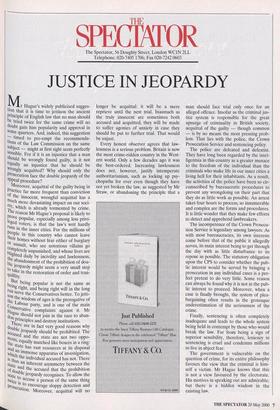SPECT mE AT OR The Spectator, 56 Doughty Street, London WC1N 2LL
Telephone: 020-7405 1706; Fax 020-7242 0603
JUSTICE IN JEOPARDY
Mr Hague's widely publicised sugges- tion that it is time to jettison the ancient Principle of English law that no man should be tried twice for the same crime will no doubt gain him popularity and approval in some quarters. And, indeed, this suggestion timed to pre-empt the recommenda- tions of the Law Commission on the same subject — might at first sight seem perfectly sensible. For if it is an injustice that a man should be wrongly found guilty, is it not equally an injustice that he should be wrongly acquitted? Why should only the Prosecution face the double jeopardy of the appeal procedure? Moreover, acquittal of the guilty being in practice far more frequent than conviction of the innocent, wrongful acquittal has a 411101 more devastating impact on our soci- ety, which is already tormented by crime. The reason Mr Hague's proposal is likely to Prove popular, especially among less privi- leged voters, is that the law's writ hardly runs in the inner cities. For the millions of People in this country who cannot leave their homes without fear either of burglary or assault, who see notorious villains go ,eompletely unpunished, and whose lives are °lighted daily by incivility and lawlessness, the abandonment of the prohibition of dou- ble jeopardy might seem a very small step to take in the restoration of order and tran- quillity. But being popular is not the same as being right, and being right will in the long ni n serve the Conservatives better. To jetti- son the wisdom of ages is the prerogative of Conservative Labour party, and is one of the main .-,ronservative complaints against it. Mr ljague should not join in the race to aban- d00 principles and destroy institutions. _. There are in fact very good reasons why Uouble jeopardy should be prohibited. The accused and the state are not two oppo- uents, equally matched like boxers in a ring: tali:, state has vast resources at its disposal w_u. an immense apparatus of investigation, isuit,ch the individual accused has not. There state an inherent asymmetry between the of and the accused that the prohibition state jeopardy recognises. To allow the #._ .Le to accuse a person of the same thing twice is to encourage sloppy detection and prosecution. Moreover, acquittal will no
longer be acquittal: it will be a mere reprieve until the next trial. Inasmuch as the truly innocent are sometimes both accused and acquitted, they will be made to suffer agonies of anxiety in case they should be put to further trial. That would be unjust.
Every honest observer agrees that law- lessness is a serious problem. Britain is now the most crime-ridden country in the West- ern world. Only a few decades ago it was the best-ordered. Increasing lawlessness does not, however, justify intemperate authoritarianism, such as locking up psy- chopaths for ever even though they have not yet broken the law, as suggested by Mr Straw, or abandoning the principle that a man should face trial only once for an alleged offence. Insofar as the criminal jus- tice system is responsible for the great upsurge of criminality in British society, acquittal of the guilty — though common — is by no means the most pressing prob- lem. That lies with the police, the Crown Prosecution Service and sentencing policy.
The police are defeated and defeatist.
They have long been regarded by the intel- ligentsia in this country as a greater menace to the freedom of the individual than the criminals who make life in our inner cities a living hell for their inhabitants. As a result, the activities of the police have been so cir- cumscribed by bureaucratic procedures to prevent any wrongdoing on their part .that they do as little work as possible. An arrest takes four hours to process, so innumerable and complex are the forms and procedures. It is little wonder that they make few efforts to detect and apprehend lawbreakers.
The incompetence of the Crown Prosecu- tion Service is legendary among lawyers. As with most bureaucracies, its own interests come before that of the public it allegedly serves, its main interest being to get through the day with as little disturbance to its repose as possible. The statutory obligation upon the CPS to consider whether the pub- lic interest would be served by bringing a prosecution in any individual cases is a per- fect pretext to do very little. Some reason can always be found why it is not in the pub- lic interest to proceed. Moreover, when a case is finally brought, the system of plea- bargaining often results in the grotesque underestimation of the seriousness of the crime.
Finally, sentencing is often completely inadequate and leads to the whole system being held in contempt by those who would break the law. Far from being a sign of superior sensibility, therefore, leniency in sentencing is cruel and condemns millions to live in abject fear.
The government is vulnerable on the question of crime, for its entire philosophy favours the view that the criminal is him- self a victim. Mr Hague knows that this is not a view favoured by the electorate.
His motives in speaking out are admirable; but there is a hidden wisdom in the existing law.









































































 Previous page
Previous page